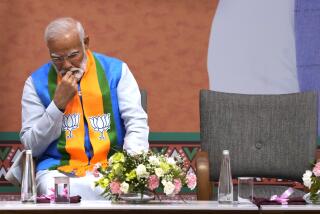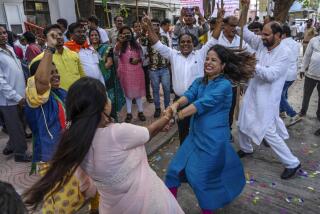India Fearful of Instability as Voting Ends : Parliament: No party is expected to win a majority, leading to weak government in a nation beset by secessionist and religious strife.
- Share via
SRIPERUMBUDUR, India — A humid breeze blew through the bomb-tattered banner announcing “A Hearty Welcome to Rajiv Gandhi, Our Beloved Leader.” A steady trickle of mourners, fresh from casting their ballots Saturday at a nearby schoolhouse, lit incense sticks and dropped floral offerings of hope and prayer on the spot where the former Indian leader was assassinated three weeks ago.
M. Venugopal, a 47-year-old silk weaver and local worker for Gandhi’s long-ruling Congress-I Party, was among the devotees, all local men and women who thought this a fitting way to end the bloodiest, most momentous election since independence and to usher in an era of unprecedented political uncertainty.
Venugopal’s vote was predictable. He cast it just after sunrise for the party of his father and his grandfather: Congress-I that has ruled India through three generations for all but 4 1/2 of its 44 years of independence.
But as Venugopal later paid homage at the eerie shrine to his fallen leader, he felt a deep foreboding for India’s future, an anxiety shared throughout this troubled land.
“I’m shivering when I walk through this place,” Venugopal said as he walked around the memorial--complete with folding chairs, Congress-I banners and a makeshift stage, just as things were May 21 when Gandhi bent down to accept a campaign garland from a young woman suicide bomber a few feet from the stage.
“I mean . . . the leader of our party has . . . been killed on this spot. And . . . now we all fear for the party. . . . Will it continue to be so good now that all of them (the Gandhis) . . . are dead?
“Rajiv stood for stability. . . . Now, we’re all worried about the future of the Congress-I. And the future of our country.”
And with good reason.
The curtain came down on India’s parliamentary election Saturday except in Punjab, where a late-night massacre underscored the government’s reasons for postponing balloting for a week. The nation’s 514 million eligible voters cast their ballots in staggered polling that spanned 30 days of violence, murder and fear.
Analysts from here in the southernmost Indian state of Tamil Nadu to the capital city of New Delhi were almost unanimous in their belief that the results not only will end India’s four decades of dynastic, Congress-I politics, but also radically alter the course of Indian politics for decades to come.
So complex are the forces at work in India that few pollsters and analysts were willing publicly to predict the outcome. Officials will start announcing results late tonight in the more than 500 parliamentary races at stake.
But most agree that no single party will win a majority. Congress-I, which had hoped that a wave of sympathy after Gandhi’s assassination would bolster its chances, was hurt more than helped by the murder of the last of three generations of Nehru and Gandhi political leaders.
The party has no credible national leader to take over after Rajiv Gandhi--as he did after the 1984 assassination of his mother, Indira, and as she did after the death of her father, Jawaharlal Nehru. Even grass-roots party workers like Venugopal fear that the party may be torn apart from inside soon after the votes are counted.
The Hindu revivalist Bharatiya Janata Party (Indian People’s Party) is emerging as the only other major national force in Indian politics, perhaps doubling its 1989 showing of 88 seats. But it is expected still to fall short of a majority.
The BJP’s ultra-nationalist goal of using the religion of 83% of the nation’s 840 million people to forge a new Hindu identity in this traditionally secular nation sets it far apart from any possible coalition partner. If BJP fails to win a majority, the revivalists and their charismatic leader, Lal Krishna Advani, will have to be content with a strong role in the opposition.
Such an outcome would leave India with a “hung” Parliament for the second time in history, a repeat of the last elections in 1989. It would trigger a flurry of horse-trading as a fractious, centrist Congress-I desperately seeks coalition partners from among Communist and Socialist opposition parties. Ultimately, most analysts say, the process would lead to yet another weak central government ruling a nation torn by escalating secessionist rebellions and religious strife.
At the heart of the dilemma lies the greatest fear of people like Venugopal: the anticipated collapse of Congress-I.
” . . . I now predict the breakup of the Congress in 1991,” declared N. Ram, editor of The Hindu, a prestigious national newspaper published in Madras, capital of Tamil Nadu state.
“There will be no glue to hold the party together,” Ram said. “It will crumble. But I welcome . . . the process--not the way it happened. I think the breakup of Congress-I and the politics of dynasty will be very healthy for the country in the long run.”
Other respected analysts in southern India, a key region that Congress-I would have to sweep to win a majority in the 545-seat Parliament, agreed. But they were not so optimistic that the process would be healthy.
“I expect an immediate split in the Congress Party,” said Cho Ramaswamy, a film director, actor and top political analyst in Madras who is more sympathetic to the Congress-I than Ram. “But we require, in my opinion, a very determined prime minister now. And I don’t see how it will happen in this election.”
That same feeling led to widespread voter apathy in northern and central India, where this year’s turnout has been the lowest in the history of a nation that bills itself as the world’s largest democracy.
In addition to apathy, voters nationwide were intimidated by campaign violence that left at least 280 people dead, the highest toll in any election period since India attained independence from Britain in 1947.
In Punjab state, where voting was delayed because of violence, at least 110 people were reported slain Saturday when Sikh militants raked two trains with gunfire near Ludhiana. The attacks, the deadliest in the Sikh separatist campaign in the northern state, were intended to disrupt the voting in Punjab planned for next Saturday. Sikh militants have called for a boycott of the election, and a score of candidates have been assassinated in the last several weeks.
Elsewhere, outbreaks Saturday included isolated bombings and machine-gun attacks that punctuated the end of the election and its violence. Particularly hard-hit have been regions like Uttar Pradesh, where the Hindu caste system and politicians’ promises to liberate lower castes at the expense of higher ones have been divisive issues.
The future role of Hinduism in Indian society also has sparked violence. The controversy is symbolized and fueled by the BJP’s national campaign to remove a 500-year-old mosque and replace it with a birthplace temple to Hinduism’s demigod, Lord Rama, in the north Indian town of Ayodhya.
But it was Gandhi’s assassination by suspected Tamil militants from Sri Lanka that radically altered India’s already precarious political balance.
Gandhi was on an 11th-hour campaign swing to try to consolidate Congress-I support in southern India when he was killed. His campaign promise that night was to bring stability back to India after a stormy 18 months of wobbly, non-Congress-I coalitions had given new impetus to secessionist movements in the key border states of Punjab and Kashmir and threatened to destroy the nation’s already weak economy.
” . . . I’m afraid the dream of stability died with Mr. Gandhi for many years to come,” Ramaswamy said.
More to Read
Sign up for Essential California
The most important California stories and recommendations in your inbox every morning.
You may occasionally receive promotional content from the Los Angeles Times.













